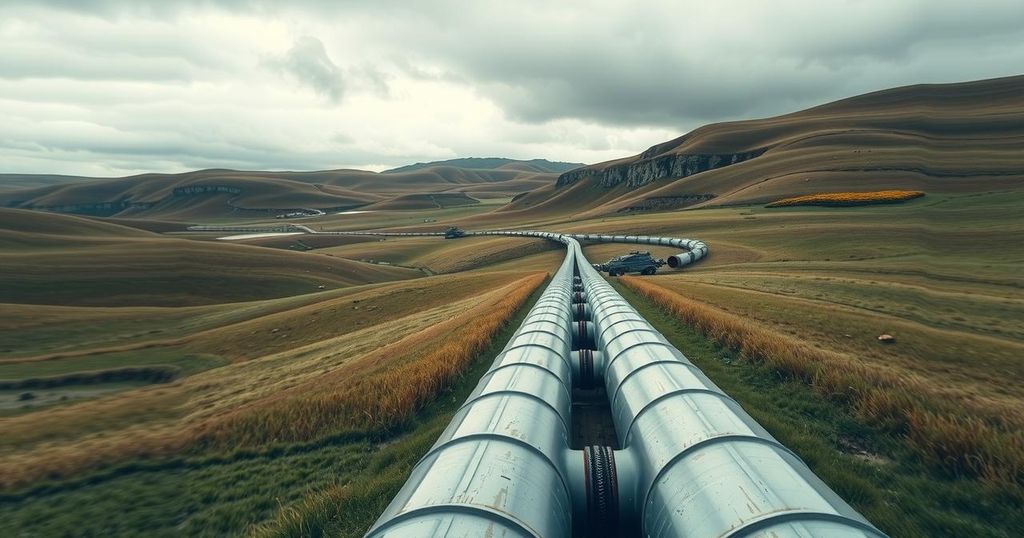Recent Developments in Ukraine-Russia Conflict: Military Actions and Diplomatic Efforts

The article reports on recent developments in the Ukraine-Russia conflict, including a surprise attack by Russian troops using a gas pipeline in Kursk, Ukraine’s diplomatic efforts for peace, France’s military support to Ukraine funded by frozen Russian assets, and concerns over US military aid cuts. Additionally, developments in regional defense and Russian territorial gains are discussed.
In a significant escalation, Russian troops have reportedly utilized a gas pipeline to conduct a surprise attack on Ukrainian forces in Kursk. Pro-Russian military blogger, Yuri Podolyaka, noted that Russian special forces infiltrated the pipeline, launching the offensive near Sudzha, aiming to oust Ukrainian troops from this strategic area. Notably, Kyiv previously seized 1,300 square kilometers of the Kursk region, possibly as leverage for future negotiations.
Ukrainian President Volodymyr Zelensky has affirmed Ukraine’s dedication to pursuing peace and is set to meet with US representatives in Saudi Arabia. He stated, “Ukraine has been seeking peace from the very first second of this war. Realistic proposals are on the table. The key is to move quickly and effectively.” This visit includes discussions with Crown Prince Mohammed bin Salman and further meetings with US officials.
In military support developments, French Armed Forces Minister Sebastien Lecornu announced plans to allocate €195 million sourced from interest on frozen Russian assets for arms supplies to Ukraine. This funding is intended for artillery shells and glide bombs for Mirage 2000 fighter jets previously provided to Ukraine. France will also be transferring older armored fighting vehicles, enhancing Ukraine’s military capabilities.
Concerns regarding US military aid to Ukraine were expressed by Shadow Home Secretary Chris Philp, who considered the suspension of military assistance and intelligence-sharing “deeply concerning.” He emphasized the need for the UK to maintain strong support for Ukraine amid Russia’s aggressive actions, reinforcing the moral imperative to help Ukraine defend itself against invasion.
In recent drone activity, a Ukrainian drone struck an industrial facility in Russia’s Chuvashia region, marking one of the deepest penetrations into Russian territory by such a strike. Although the attack caused no injuries, Governor Oleg Nikolayev confirmed the event and said emergency services were dispatched. Details surrounding the damage remain unclear, underscoring the complexities of ongoing warfare.
Former deputy prime minister Lord Michael Heseltine has called for a reevaluation of Brexit in light of the changing dynamics of defense and security amidst US military aid withdrawal to Ukraine. He advocates for a European military command to strengthen continental defense capabilities.
Latvian President Edgars Rinkevics urged European nations to adopt conscription and bolster defense spending, citing military vulnerabilities given the current geopolitical climate. Latvia’s conscription measures have been in place for two years, with defense spending reaching four percent of GDP.
On the ground, Russian Defense Ministry reported the capture of Konstyantynopil and village Lebedevka in the Donetsk and Kursk regions respectively, underscoring increased regional tensions as Russian forces intensify their offensives.
The ongoing conflict between Ukraine and Russia remains dynamic and complex. Russian forces are employing new tactics, such as using gas pipelines for surprise attacks, while Ukraine continues to engage in diplomatic efforts for peace. Simultaneously, military support from nations like France and concerns over US aid highlight the international implications of the war. Calls for strengthening European defense illustrate a growing recognition of the need for enhanced military readiness in response to escalating tensions.
Original Source: www.independent.co.uk







